Landcare NSW (LNSW), under a contracted agreement with the NSW Biodiversity Conservation Trust (BCT), is supporting regional Landcare networks in raising awareness and promoting private land conservation efforts across the state.
The Private Land Conservation Matters (PLCM) program builds on the successful foundation of the 2020-2022 Partnering in Private Land Conservation program, which focused on enhancing the understanding of the importance of biodiversity at a grass roots level and the role of the BCT in protecting and enhancing biodiversity on private land across NSW.
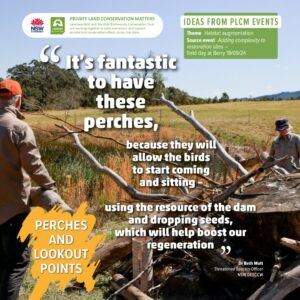 The PLCM program is a regionally co-designed, collaborative, community education initiative that aims to:
The PLCM program is a regionally co-designed, collaborative, community education initiative that aims to:
~ Build understanding and practical skills in biodiversity conservation, strengthening landholders’ knowledge and capacity to manage their land for conservation outcomes
~ Provide supportive networks of like-minded landholders to enhance local social connections and showcase conservation outcomes on private land
~ Educate private landholders about conservation opportunities offered by the BCT
~ Increase participation in private land conservation across the broader Landcare community
~ Raise public awareness of the importance of biodiversity conservation on private land
~ Deliver regionally informed events that align with the BCT’s regional priorities.
Across the state 12 regional Landcare networks have received funding to host biodiversity-focused events under the PLCM program.
Wherever possible events are hosted on the property of private landholders with BCT covenants so that on-ground activities can be discussed and the actions seen firsthand, with landholders sharing their stories of their conservation journey on their own land.
Please contact Landcare NSW or your Regional Landcare Network for more information on how to participate.
IDEAS FROM THE REGIONS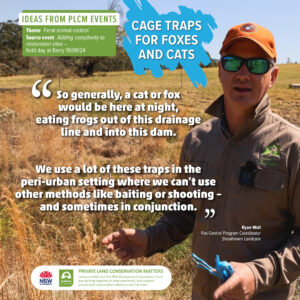
There have been 144 events held under the PLCM project. To amplify the reach, and share the learning outcomes a series of information sheets and two videos have been developed for conservation-minded landholders and others interested in conservation land management.
The info sheets in the series are
- PLCM INFO Habitat augmentation around a dam
- PLCM INFO Cage traps
- PLCM INFO Hollowhog v’s nest boxes
- PLCM INFO Myrtle rust and Phytophthora
- PLCM INFO Woody Weed Tools
The feature videos are
There are 20+ snippets of videos to share on the LNSW YouTube channel
- Playlist – Private Land Conservation Matters
The PLCM portal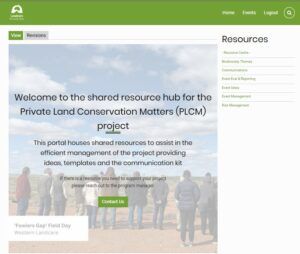
There were 144 events held during 2023-25 as part of the Private Land Conservation Matters project. The details, photos and outcomes from these events have been captured and collated on the PLCM portal. Events can be searched by theme, region or time of year if event information interrogation is your interest.
What would be a good follow-on event? Review what the participants thought for some ideas.
To get access to the Resource Centre visit https://plcm.landcarensw.net.au/ . For those involved in Landcare, if you want additional resources from the Resource Centre you’ll be asked to register and then be sent a unique login.
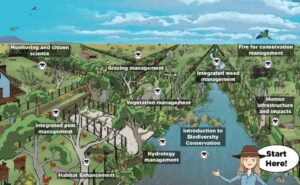 WOULD YOU LIKE TO LEARN MORE?
WOULD YOU LIKE TO LEARN MORE?
The NSW Biodiversity Conservation Trust’s online conservation land management e-learning modules provide an opportunity to learn and improve skills in conservation at your own pace and it’s free!
The course was created in partnership with the NSW Department of Primary Industries’ Tocal College. It complement existing conservation management guidelines and resources, webinar content and the conservation management plans of agreement-holders.
REGIONAL LANDCARE NETWORKS PARTICIPATING IN PLCM
The regional projects are summarised below with links to the events that have been delivered and their outcomes, providing insights to the day, learning outcomes, follow-up topics and resources that have been developed where available.
Across the state, Regional Landcare Networks have been funded to develop networking, education and communication activities with private landholders. These projects will build understanding of private land conservation and increase opportunities for regional Landcare and BCT staff and volunteers to meet and share their knowledge and skills.
Private landholders will be provided with opportunities to network, participate in education and training activities and share their stories of conservation on their own land.
Current regional projects are summarised below.
Please contact Landcare NSW or your regional Landcare Network for more information on how to participate.
Central Tablelands: Partnering for Biodiversity
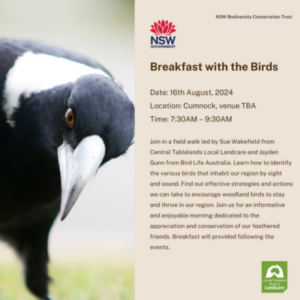 The Partnering for Biodiversity in the Central Tablelands project aims to strengthen landholder connections and increase awareness of the value of biodiversity. In particular, why it is critical to restore, enhance and conserve it; and to acknowledge the beneficial outcomes through coexistence of farming and biodiversity: raising the awareness of the various ecosystem services that can be generated as a result.
The Partnering for Biodiversity in the Central Tablelands project aims to strengthen landholder connections and increase awareness of the value of biodiversity. In particular, why it is critical to restore, enhance and conserve it; and to acknowledge the beneficial outcomes through coexistence of farming and biodiversity: raising the awareness of the various ecosystem services that can be generated as a result.
The partnership between the BCT and Landcare NSW, along with the involvement of the Central Tablelands Regional Landcare Network in delivering events, illustrates a unified approach to environmental conservation, emphasizing shared goals and leveraging collective resources for greater impact in safeguarding NSW’s biodiversity.
Events held include Creek Feast, Soils Alive! What is the ideal fungi:bacteria ratio?, Understanding soils & biodiversity paddock walk, Breakfast with the Birds,
There is also a case study on Mycology May in the Central Tablelands
Visit the Central Tablelands Regional Landcare website for more details about their PLCM events
Western: Learning from Biodiversity Conservation in the Rangelands
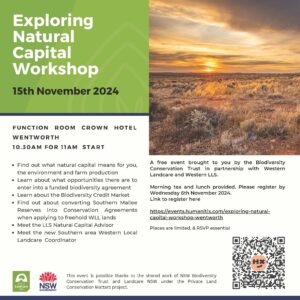 Western Landcare NSW is working with the BCT and Local Land Services Western to increase the awareness of biodiversity conservation projects in the western region and share the learnings from these events.
Western Landcare NSW is working with the BCT and Local Land Services Western to increase the awareness of biodiversity conservation projects in the western region and share the learnings from these events.
The project has hosted a ‘Growing Natural Capital in the Region Forum and held a series of Growing Natural Capital workshops around the region.
Two case studies are available
South East Private Land Conservation Matters
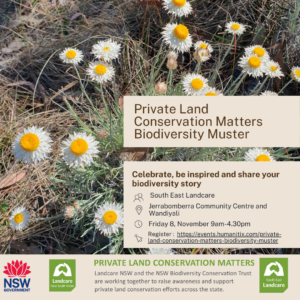 In 2024 South East Landcare collaborated with eight district Landcare groups to deliver a series of events in the region covering a diverse range of topics including Plant identification Paddock Walks, Love reptiles roadshow, Glider Talk & Shine, Fungi Discovery Workshop, A Bird in the hand- Citizen Science Workshop, a Biodiversity Muster.
In 2024 South East Landcare collaborated with eight district Landcare groups to deliver a series of events in the region covering a diverse range of topics including Plant identification Paddock Walks, Love reptiles roadshow, Glider Talk & Shine, Fungi Discovery Workshop, A Bird in the hand- Citizen Science Workshop, a Biodiversity Muster.
Webinars were recorded on
There is a Case Study on Partnering in Biodiversity to Provide Hollow Habitat
Visit South East landcare’s website for more details about their PLCM events
Mid Coast to Tops: Conservation on Private Land
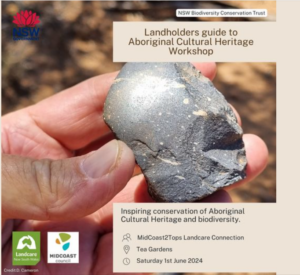 On the Mid Coast of NSW, there’s no shortage of engaged landholders managing their property for biodiversity values. The PLCM project enables Mid Coast 2 Tops Landcare Connection to provide landholders with the ongoing support and resources to effectively in conservation on private land. Through the appointment of a dedicated Project Officer, Mid Coast 2 Tops has been reconnecting with previously engaged landholders and revitalising the community of practice between conservation minded landholders of the Mid Coast.
On the Mid Coast of NSW, there’s no shortage of engaged landholders managing their property for biodiversity values. The PLCM project enables Mid Coast 2 Tops Landcare Connection to provide landholders with the ongoing support and resources to effectively in conservation on private land. Through the appointment of a dedicated Project Officer, Mid Coast 2 Tops has been reconnecting with previously engaged landholders and revitalising the community of practice between conservation minded landholders of the Mid Coast.
Some of the events held to date include; How to build a Wildlife Watering Station, Birds and Biodiversity on farms, Rainforest Plant ID with Dr Bill McDonald, Soil Super heroes with Dr Sandra Tuszynska, Koala Field ID Techniques field day, Waulinbakh Forest Tour- AWC landholder
Case studies have been produced on
Riverina: Partnering in Private land Conservation
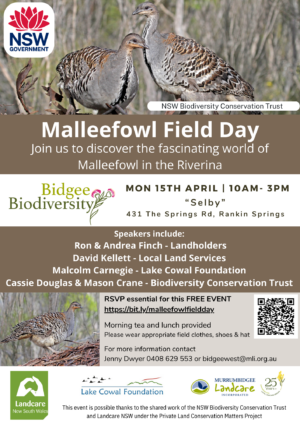 Coordinated by Murrumbidgee Landcare Incorporated as part of a statewide education initiative, the program of activities held in 2024 -2025 included
Coordinated by Murrumbidgee Landcare Incorporated as part of a statewide education initiative, the program of activities held in 2024 -2025 included
- Workshops & Resources: Practical workshops and tailored educational materials delivered in collaboration with local Landcare groups and stakeholders such as The Malleefowl Field day, Western Riverina Seed Workshops
- Community Engagement: Open events for BCT Agreement holders and other conservation-minded landholders to build skills, knowledge, and peer networks such as the Community Spotlighting Night , Platypus Education Workshop
- Collaboration & Networking: Opportunities for landholders, BCT staff, and Landcare groups to connect, share expertise, and strengthen conservation efforts such as the Paddock to Plate, Cultural Connections in Conservation
- Education & Training: Expert-led sessions on best practices in biodiversity management such as Nature’s Balance Sheet- Understanding Natural Capital
Case studies have been created on;
- Bring Back the Glossy Black
- The Biodiversity Benefits of a Healthy Dam
- Collaboration to bring biodiversity and conservation education to Yanco Primary School
Visit MLI’s website for more details about their PLCM events
Central West: Protecting Precious Patches
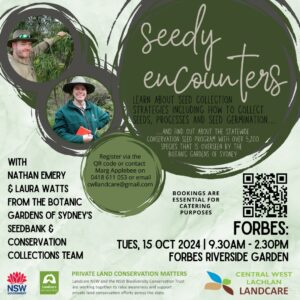 In the Central West region the project has delivered workshops on Mycology in the Mix, Improving on Farm Biodiversity and Seedy encounters. The delivery of the project saw each of the workshops repeated at 5 locations across the Central West region engaging the wider community, enhancing landholder knowledge base and building & strengthening the Landcare and BCT relationship in the region.
In the Central West region the project has delivered workshops on Mycology in the Mix, Improving on Farm Biodiversity and Seedy encounters. The delivery of the project saw each of the workshops repeated at 5 locations across the Central West region engaging the wider community, enhancing landholder knowledge base and building & strengthening the Landcare and BCT relationship in the region.
Murray: Connecting Private Land Conservation Project
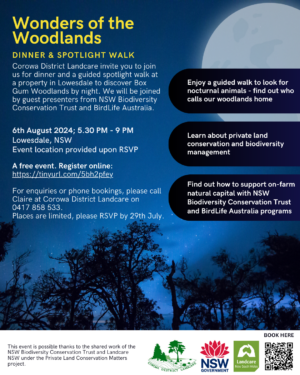 The Murray Landcare Collective has been delivering an exciting series of community events across the Murray to celebrate and investigate private land conservation in the region. The local landcare groups in partnership with the Murray-Riverina BCT team have hosted guided tours of farms with significant biodiversity projects and showcased the ways enhancing biodiversity benefits your farm business and local environment. The groups involved in the PLCM project include
The Murray Landcare Collective has been delivering an exciting series of community events across the Murray to celebrate and investigate private land conservation in the region. The local landcare groups in partnership with the Murray-Riverina BCT team have hosted guided tours of farms with significant biodiversity projects and showcased the ways enhancing biodiversity benefits your farm business and local environment. The groups involved in the PLCM project include
- Corowa District Landcare
- Holbrook Landcare Network
- Rice Grower’s Association of Australia
- West Hume Landcare
- Western Murray Land Improvement Group
The events to date have included a wide range of site visits such as Farming for Tomorrow: Monitor, manage and Improve natural capital on Your farm, Wet & Wild Lands Tour, Biodiversity in Barham
Building social connections was a theme at events like Aboriginal Tools & Techniques – Cultural Workshop and Wonders of the Woodlands – Dinner & Spotlight Walk
Biodiversity focused events such as Guarding the Grasslands and Biodiversity Day at the Tops- Montane Peatlands introduced attendees to diverse aspects of land management.
Case studies have been produced on
North-West: Private Land Conservation Matters
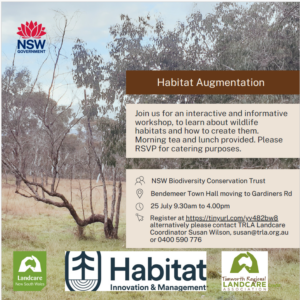 The North-West Private Land Conservation Matters Project has been delivered by Tamworth Regional Landcare Association hosting a range of activities based on advice from local landcare groups, Landholders and regional BCT priorities .
The North-West Private Land Conservation Matters Project has been delivered by Tamworth Regional Landcare Association hosting a range of activities based on advice from local landcare groups, Landholders and regional BCT priorities .
The project has held well attended events on Weeds- a Prickly Problem, Habitat Augmentation and Recovering Natural Ecosystem.
These events are
- Supporting participants to develop social groups around an interest in biodiversity
- Enhancing skills and knowledge for landholders managing biodiversity in productive landscapes
- Creating connections between existing conservation agreement holders and
- Sharing landholder’s experience of biodiversity conservation.
Greater Sydney: Increasing landholder knowledge and participation in private land conservation across Greater Sydney
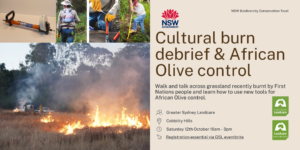 Sydney’s Camden/ Cobbitty areas and the Central Coast were targeted for engagement with private landholders. A regenerative burn with Traditional Owners in Cobbitty, along with a follow up so see first hand the outcomes and discuss with Woody Weed control were well attended events.
Sydney’s Camden/ Cobbitty areas and the Central Coast were targeted for engagement with private landholders. A regenerative burn with Traditional Owners in Cobbitty, along with a follow up so see first hand the outcomes and discuss with Woody Weed control were well attended events.
On the Central Coast Threatened Species in the McDonald Valley and a Threatened Species Forum provided opportunities for networking and learning.
North Coast: Conservation Together – linking private conservation landholders to connect, share and learn
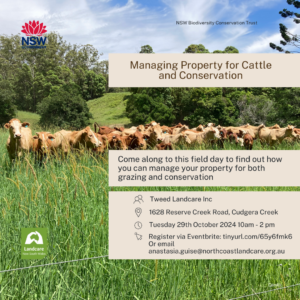 The North Coast has a strong private land conservation movement that achieves excellent outcomes for wildlife habitat protection, connectivity and regeneration – all key Landcare objectives.
The North Coast has a strong private land conservation movement that achieves excellent outcomes for wildlife habitat protection, connectivity and regeneration – all key Landcare objectives.
Connecting landholders especially Biodiversity Conservation Trust (BCT) agreement holders, to Landcare networks was a high priority for the North Coast with five Conservation Conversation Sessions held across the region.
Skills and technical capacity to deliver best practice conservation were the focus of the field days Exploring Ecotones from Rainforest to Dry Sclerophyll, Property management for cattle and conservation and the Riverbank Restoration Field Day
Hunter Region Landcare Network
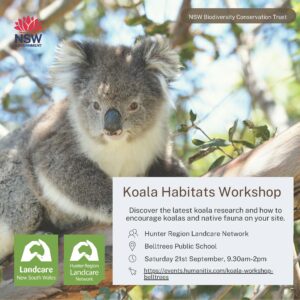 The Hunter Region Landcare Network assisted local groups to connect with BCT agreement holders in the Upper, Mid and Lower Hunter regions through the delivery of locally specific workshops that aligned with regional priorities.
The Hunter Region Landcare Network assisted local groups to connect with BCT agreement holders in the Upper, Mid and Lower Hunter regions through the delivery of locally specific workshops that aligned with regional priorities.
The community interest in koalas was apparent at the Koala Spotting Workshop at Duns Creek and the Koalas Food Trees in the Tops2Tops Corridor. The Hollow Hogs v’s Nest box field day along with Eucalypt ID and Seed Collection and propagation highlighted the challenges in conserving remnants and propagating future cohorts of canopies.
The Dry Rainforest conversations and Rainforest walk has started to enhance understanding of this threatened landscape across the Hunter and the quest to connect the remnant
New England: Protecting New England Biodiversity
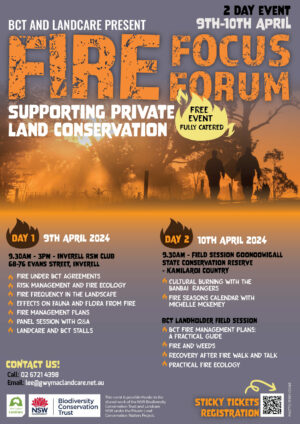 The protecting New England Biodiversity project has a major focus of building awareness and capacity between the BCT and Private Land Conservation holders and Landcare.
The protecting New England Biodiversity project has a major focus of building awareness and capacity between the BCT and Private Land Conservation holders and Landcare.
In 2024 the 2-day Fire Focus Forum provided an opportunity for landholders engaged in or considering private land conservation programs in the New England Region to learn about the mechanics of fire, enhance their understanding of the cultural significance of fire and see the impacts of fire on a BCT covenanted property.
There has also been two videos produced
- Bush For Biodiversity (video)
- Protecting New England Biodiversity (video)– a great landholder viewpoint
Frequently Asked Questions
1. What is Private Land Conservation?
Private land conservation occurs where a private landholder manages some or all of their land for biodiversity, nature or wildlife conservation purposes. In NSW, a landholder can enter into a private land conservation agreement, which forms part of the National Reserve System. Depending on the type of agreement and type of land they can access funding and resources from the government (specifically the Biodiversity Conservation Trust) and non-government organisations for different types of management activities.
2. What is the Biodiversity Conservation Trust?
The Biodiversity Conservation Trust (BCT) is an NSW Government statutory body that sits under the Department of Planning, Industry and Environment. The BCT enters into agreements with landholders to protect areas of their land for conservation as well as support conservation in the form of technical support and, in some cases, annual or grant funding. We also have a role in supporting the offsets scheme. See here for a video describing BCT’s work and to find out more about the BCT visit https://www.bct.nsw.gov.au/
3. Why is Landcare involved in this partnership?
NSW Landcarers are leaders in biodiversity conservation activities across NSW. Landcare NSW partners with organisations whose objectives align with Landcare in NSW. These are then shared with our network as optional opportunities to engage in. This increases the support Landcarers can provide to our environment and community.
Landcare groups work with private landholders across the state to support them in biodiversity conservation activities. By developing partnerships with other organisations whose objectives align with Landcare in NSW, our community can benefit from diverse skills, experiences and opportunities for private landholders and the wider NSW Landcare community.
NSW Landcare groups have worked on private land conservation projects with the BCT in different ways since it was established in 2017, and with the Nature Conservation Trust prior to 2017. This partnership builds on that relationship and expands it to some regions and networks who are only beginning to explore Biodiversity Conservation Agreements in their community. This partnership will help Landcare to grow its connections with private landholders including those who are part of the BCT network and ensure these landholders have the best, local advice on conservation available to them.
4. What is the expected knowledge of private land conservation agreements and the BCT?
There are many opportunities and activities private landholders may wish to undertake to support both biodiversity and production on their land. Through this project, Landcare Coordinators may be asked questions about these options.
The NSW Biodiversity Conservation Trust (BCT) is the key NSW body in this space, offering a range of agreements for landholders with accompanying technical support, and in many cases, annual funding or financial support in the form of grants. With this range of agreements comes varying complexities, and Landcare is not expected or equipped to answer specific questions about the BCT’s programs but may be a first point of contact for a landholder to then learn from other landholders or connect with an expert.
We encourage coordinators to connect interested landholders with the resources available on the BCT’s website, and to connect landholders with the regional contact/s at the BCT to discuss the opportunities they have on offer. General resources to assist in your understanding of BCT opportunities include: https://www.bct.nsw.gov.au/general-resources and this decision tool for BCT agreements.
5. How does private land conservation work in NSW?
The BCT is a statutory not-for-profit body established under Part 10 of the Biodiversity Conservation Act 2016 which began operating on 25 August 2017.
The role of the BCT is to promote and support private landholders in conserving and managing biodiversity on their land.
BCT does this through agreements, funding and grants such as:
Conservation Management Program
If a landholder’s property is in a high priority area, they can apply for a funded conservation agreement by participating in the fixed price offer or conservation tenders. Landholders identify an area on their land to be actively managed for conservation and receive annual conservation management payments for agreed management activities. More information here.
Conservation Partners Program
Landholders can enter into voluntary agreements with the BCT. Landholders identify an area on their land to be conserved for biodiversity conservation and can apply for grants to undertake conservation management activities. More information here.
Biodiversity Offsets Program
Landholders wishing to generate and sell biodiversity credits can enter into a Biodiversity Stewardship Agreement with the BCT. Landholders receive annual payments for carrying out conservation management actions on the site. Landholders may sell their biodiversity credits to developers, the BCT (which secures offsets on behalf of developers who choose to pay into the Biodiversity Conservation Fund) or to any other third party. More information here.
The partnership between Landcare NSW and the BCT will assist Landcare groups across the state to better understand these agreements and work with our partners in the BCT. See here for a video on the importance of BCT’s work. For any more information on Private Land Conservation can be found on BCT’s website: www.bct.nsw.gov.au. To learn more about the project, contact Landcare NSW or your local BCT staff member.
6. What are the objectives of this partnership?
Landcare NSW and the BCT will be partnering to raise awareness and support private land conservation efforts across NSW. This partnership aims to support collaboration between BCT regional staff and local Landcare groups across the state. The BCT recognises that Landcare has been mobilising locals and taking action on a range of issues for decades and has significant skills, expertise, and local knowledge that align with our common objectives.
There are three project objectives:
• Building understanding and capacity between the BCT and local Landcare groups to complement each other’s knowledge and skills and plan how to work together.
• Building biodiversity conservation knowledge with landholders through communication and education initiatives. This will be delivered through grant funding to eligible groups who wish to participate.
• Increase the participation of landholders in private land conservation programs.
7. What will Regional Landcare and Local Landcare Organisations be doing?
Regional Landcare networks have been funded to coordinate private land conservation networking, education and communication activities across their regions.
Activities have been co-designed by Landcare and Biodiversity Conservation Trust in order to complement each other’s knowledge and skills and plan how to work together to support private land conservation.
Activities will be coordinated by regional Landcare groups who may employ a private land conservation coordinator or support local landcare groups to run activities in their areas.
Four initiatives have been identified as part of this partnership:
1. Building understanding
o Ongoing regional co-design and partnership review
2. Local Networks and clusters of Agreement holders for support
– Organise local networks to enable landholders to develop knowledge, obtain peer support, with the aim of connecting and supporting landholders in their private land conservation activities
3. Landcare-run field days and other learning events
– Peer-to-peer learning events for landholders to learn from local examples and hear about the experiences of other landholders and locally recognised experts
4. “In their own words” stories to assist communication and information sharing
– Sharing stories from local landholders and experts to support learning and information sharing on private land conservation.
8. How can Landcare groups get involved?
Regional Landcare organisations have been funded to deliver private land conservation activities. Local Landcare Groups should contact their regional body to find out how they can participate in these activities.
9. Who can Landcare groups contact for more information?
The primary contact for the Private Land Conservation Matters Project is Suzanne Pritchard from Landcare NSW through her email: spritchard@landcarensw.org.au
As the project progresses, Regional Landcare Coordinators will be able to provide region-specific advice and assist in the development of project EOIs. Landcare groups can also always contact their regional BCT staff members.
